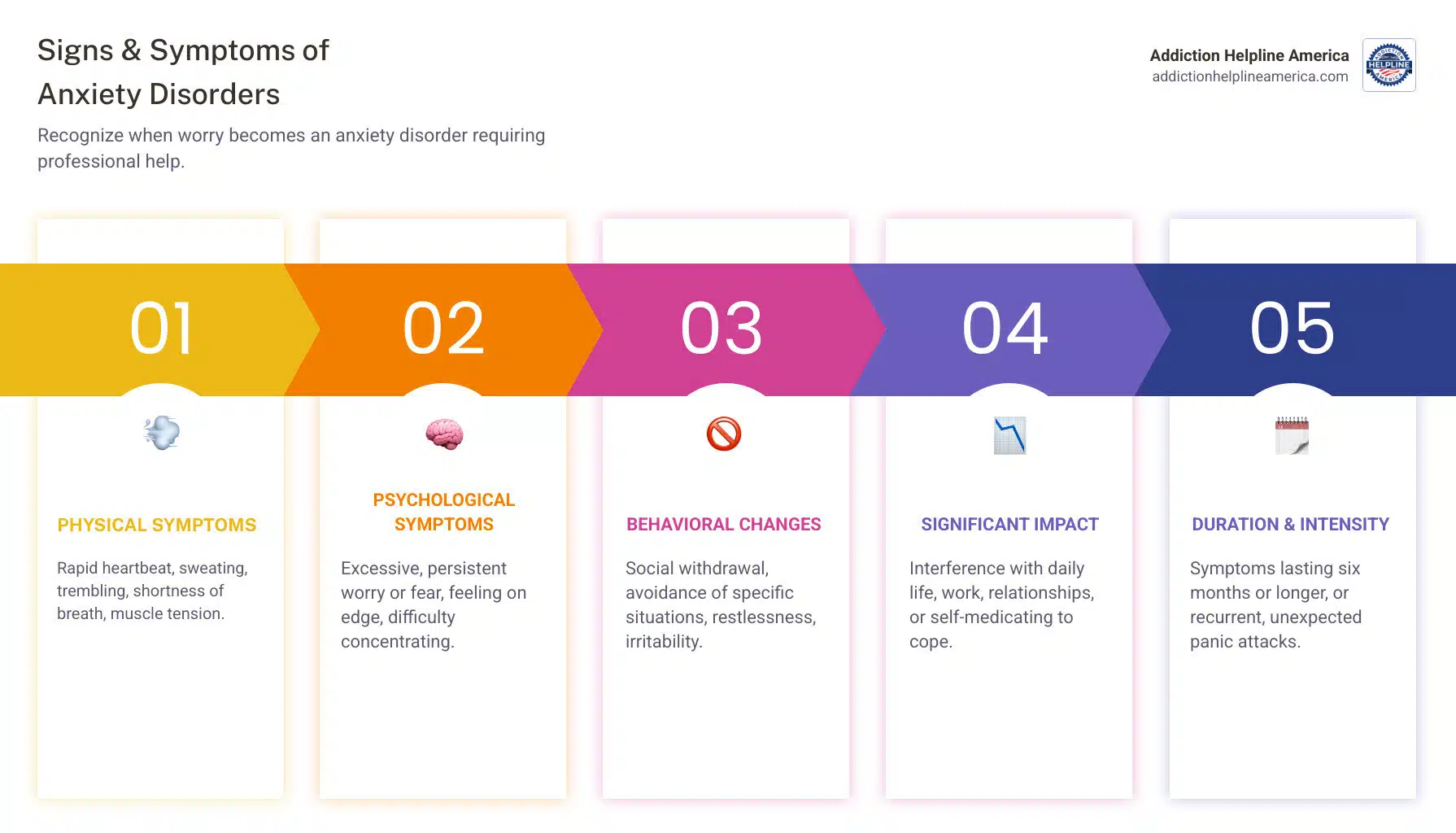Anxiety Disorder Treatment Centers provide specialized care for individuals whose anxiety has become overwhelming and interferes with daily life. If you’re searching for help, here’s what you need to know.
When to seek professional anxiety treatment: Professional help is crucial if your anxiety lasts six months or longer, you experience recurring panic attacks, you avoid daily activities due to fear, you’re self-medicating with alcohol or drugs, or your anxiety causes severe depression or suicidal thoughts.
While occasional worry is normal, clinical anxiety involves persistent, unfounded fears that disrupt work, relationships, and daily life. More than 18 percent of American adults experience an anxiety disorder, making it the most common mental illness in the U.S.
The good news is that anxiety is highly treatable. With the right combination of therapy, medication, and support, individuals can learn to manage their symptoms. Many treatment centers report that 95% of patients learn to control their symptoms with healthier coping skills after completing their programs.
At Addiction Helpline America, we connect individuals and families with effective anxiety treatment resources nationwide. Our team understands that finding the right Anxiety Disorder Treatment Centers is crucial for recovery, especially when anxiety co-occurs with substance abuse.

Anxiety is a normal human emotion, but when it becomes constant and controlling, it may be an anxiety disorder. Understanding the difference is the first step toward getting help from specialized Anxiety Disorder Treatment Centers.
Knowing when to seek help can be difficult. Key signs include:
If your anxiety is constant, interferes with your life, feels uncontrollable, or leads to thoughts of self-harm, it’s time to seek professional treatment.
Anxiety Disorder Treatment Centers treat a range of conditions, each with unique characteristics:
Anxiety rarely exists in isolation. It often co-occurs with other conditions like substance abuse or depression, a situation known as a dual diagnosis. People with anxiety disorders are twice as likely to struggle with substance abuse, according to data from the National Institutes of Health.
This is why integrated treatment is essential. Effective Anxiety Disorder Treatment Centers address both anxiety and any co-occurring condition simultaneously. Treating one without the other is often ineffective. At Addiction Helpline America, we prioritize connecting you with centers that offer this comprehensive, integrated care to treat the whole person for lasting recovery.


Take the first step towards a healthier life! Call now to connect with our compassionate team and start your recovery journey today. Your path to healing awaits!
Our recovery specialists are available 24/7 to provide support, and all calls are confidential and free. Reach out anytime – we’re here to help!
Effective Anxiety Disorder Treatment Centers use personalized plans that combine proven therapies, medication management, and different levels of care to meet your specific needs.
Quality treatment is built on scientifically validated therapies that provide real tools for managing anxiety.

For many, medication is a vital tool that can stabilize mood and reduce severe symptoms, making it possible to engage fully in therapy. Medication management is overseen by a medical professional to find the right medication and dosage with minimal side effects.
Medication is most effective when used in collaboration with therapy. For those with co-occurring substance use disorders, Medication-Assisted Treatment (MAT) may be used to address addiction while managing anxiety.
Quality centers offer a spectrum of care to match the severity of your symptoms.

Finding the right Anxiety Disorder Treatment Centers is a critical step in your recovery. It’s about finding a partner with the right expertise in a safe, supportive environment.
At Addiction Helpline America, we guide people through this process daily. Let’s break down the key considerations.
Ensure any facility meets professional standards to guarantee quality care.
Once credentials are confirmed, assess if the center’s approach is right for you.


Take the first step towards a healthier life! Call now to connect with our compassionate team and start your recovery journey today. Your path to healing awaits!
Our recovery specialists are available 24/7 to provide support, and all calls are confidential and free. Reach out anytime – we’re here to help!
Understanding healthcare costs can be stressful, but you don’t have to do it alone.
Navigating insurance is complex. Our team is here to help you understand your coverage and find quality treatment that fits your financial situation.
For information on public programs, visit the Centers for Medicare & Medicaid Services (CMS).
When considering Anxiety Disorder Treatment Centers, it’s normal to have questions. Here are answers to some of the most common ones.
There’s no one-size-fits-all timeline. The length of treatment depends on the severity of your symptoms, your specific disorder, and the level of care you need.
Recovery is a journey, and many people move through a “continuum of care,” stepping down from more intensive programs to ongoing outpatient support.
Yes, absolutely. For many people, virtual therapy has proven to be just as effective as in-person treatment for anxiety disorders.
Telehealth offers significant benefits:
Virtual care is ideal for non-acute symptoms and as step-down care after an intensive program. Always ensure the provider uses a secure, HIPAA-compliant platform to protect your privacy.
Understanding this distinction helps you find the right fit.
If anxiety is your primary struggle, especially if it’s complex or co-occurs with substance use, a specialized center often provides a more targeted and comprehensive approach.
At Addiction Helpline America, we help you determine which type of facility best suits your needs. Find the right anxiety treatment program for you by reaching out to our team today.
If you’ve read this guide, you’ve already taken a crucial step: educating yourself about anxiety and your treatment options. While navigating this path can feel overwhelming, please hold onto this truth: you don’t have to do this alone, and recovery is possible.
We’ve covered how Anxiety Disorder Treatment Centers work, from recognizing the signs to understanding the evidence-based therapies that lead to healing. The most important message is that anxiety is highly treatable. According to the Anxiety and Depression Association of America, the vast majority of people with anxiety disorders can find significant relief with proper treatment.
Choosing the right center is a personal decision based on factors like specialization, accreditation, and your specific needs. The goal is to find a program that respects your circumstances and supports your recovery goals.
At Addiction Helpline America, we are dedicated to connecting people with effective treatment resources. We understand that searching for help while struggling with anxiety and substance use can feel paralyzing. Our team offers free, confidential guidance to help you steer your options and find a trusted provider from our network.
Recovery requires courage, but you’ve already shown it by seeking information. You deserve a life free from the grip of fear and worry. Let us help you take the next step on your journey to healing.
Are you or a loved one struggling with addiction? Call today to speak to a treatment expert.
For anyone seeking help for addiction for themselves or a loved one calls to Addiction Helpline America are completely confidential and available 24/7.
Please note: any treatment center listed on our site that receives calls is a paid advertiser.
Calls to a specific treatment center’s listing will be connected directly to that center.
Calls to our general helpline will be answered by treatment providers, all of whom are paid advertisers.
By calling the helpline, you agree to our terms and conditions. These calls are free of charge and carry no obligation to enter treatment. Neither Sober Steps nor anyone answering your call receives a commission or fee based on your choice of treatment provider.
If you’d like to explore additional treatment options or connect with a specific rehab center, you can browse our top-rated listings, visit our homepage, or call us at (844) 561-0606. You may also contact us for further assistance.
Calls to any general helpline will be answered or returned by one of the treatment providers listed, each of which is a paid advertiser:
Our helpline is available 24 hours a day, 7 days a week at no cost to you and with no obligation for you to enter into treatment. We are committed to providing support and guidance whenever you need it.
In some cases, Addiction Helpline America charges our verified partner a modest cost per call. This fee helps us cover the costs of building and maintaining our website, ensuring that we can continue to offer this valuable service to those in need.